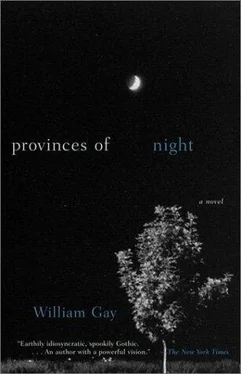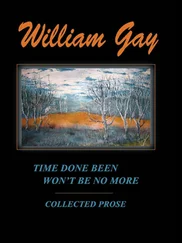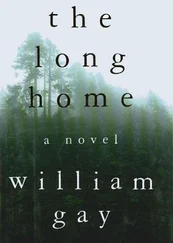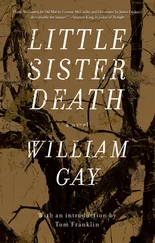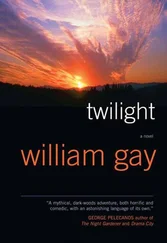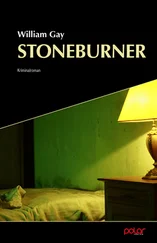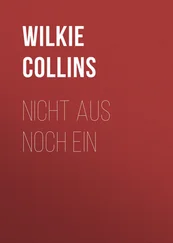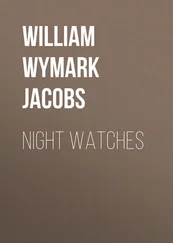I was just going to ask you about that. How about going to the show with me next weekend?
She nodded her head toward the house. You heard her opinion of Bloodworths.
I also heard you say you don’t tell her how to live her life and she don’t tell you how to live yours.
Well. She smiled. I guess you’ve got me there. You could try and see.
It’s a long way down here just to try and see.
Don’t you think I’m worth it?
Yes. I know you’re worth it. I’ll try and see.
Have you got a car?
Of course I’ve got a car, he said, wondering where he’d get one. But such minor details could be worked out later.
She suddenly placed both hands on his forearm as if she’d use it for leverage to raise herself higher and tiptoed and kissed him on the mouth. He turned to hold her but she’d pulled away and she was already going up the walk toward the house.
A mile or so out of Clifton Albright pulled onto the shoulder of the road. Maybe you’d better do this, he said. The road keeps fadin in and out like. I don’t know what’s the matter with it.
Fleming got out and came around and slid under the wheel. Albright had scooted over and was resting his face against the glass.
I might as well, Fleming said. If I’m goin to get killed I may as well have some control over it.
What would it matter if you got killed, Albright said. You was kissed on the mouth by Raven Lee Halfacre. What in the world did you do to her to make her do that?
Fleming didn’t reply. After a while he looked over and Albright was asleep with his head against the window. He drove on. The thought of her hands on his forearm as she’d tiptoed to kiss his mouth lessened the ache in his thigh, straightened the curves in the road toward Ackerman’s Field. The weight of her head on his shoulder as he watched the fireflies.
There was something oddly restful about the fireflies. He couldn’t put his finger on it but he drew comfort from it anyway. The way they’d seemed not separate entities but a single being, a moving river of light that flowed above the dark water like its negative image and attained a transient and fragile dominion over the provinces of night.

I N DETROIT Boyd had worked for a time in a steel mill, stoking furnaces in an atmosphere so charged with fire and noise and molten metal he seemed constantly to toil in the eye of an electrical storm, a place if not hell then certainly the room across the hall from it, a foundry that he felt might be more aptly occupied by scaleyskinned demons or other of the devil’s toadies. Then he got a job in a factory loading huge rolls of corrugated cardboard onto a machine that sucked the cardboard off the roll into itself and spat it out in cardboard boxes.
He was a man much to himself. He asked no questions, and in turn was asked few himself. He seemed to be descending into a well of silence so deep the hammering of machinery was as impotent to defray it as the discordant jangling jukeboxes that furnished the hillbilly bars he haunted at night. He’d eat his meager supper and bathe and put on clean clothes that were just like the clothes he’d taken off except laundered and go into the nighttime bars where other hillbillies crossed and re-crossed in tangents of random violence as if they were all looking for something they’d lost.
These folk from Arkansas, Tennessee, Missouri did not seem to melt into the common culture of the city. They seemed to have changed only in the matter of geography. They were who they were. Drop them into a beaker of acid and they would list down and rest unchanged on the bottom, unassimilated, unrepentant, unreconstructed. All these folk seemed to have more past than future and it was a common past of failure and loss and they seemed to recognize each other on sight as Masons were told to do.
So he never doubted that he would find them. The peddler was much given to drink and Boyd had only to haunt the bars in the hillbilly section of Detroit. Trash always settles to the bottom, he had told himself, drifting downward himself. The wonder was not that he found them, but that it took so long. They must have been moving through the gaudy neon half a beat out of sync, coming when he was going, arriving when he’d just left.
He saw them once crossing the street where Delancey intersected 114th. He saw them first from the back, but he knew them instantly, as if something had been encoded into him so that he would have known them from the ghost of a reflected gesture, from a scuffmark on the sidewalk. Boyd’s wife had said something and the man had turned to hear. Something grinning and obsequious in his manner gave Boyd a moment of unease, perhaps he was killing the wrong half of this couple. The peddler seemed deferential and indecisive. Yet something ran through Boyd tangible as a seismic tremor, he felt an actual altering of his heartbeat, a change in the speed of the blood coursing through his body.
He was stopped from killing the peddler not by any compunction at violence or even by the fear of getting caught in so public a place under the eyes of scores of witnesses but by the sheer and abrupt realization that it would be the end of something. It was less a jumping off place than a denouement. He had not thought beyond it. He did not know what came next. He was at the point on an ancient map beyond which the old cartographers had drawn dragons.
He went back to his room at the boarding house and lay on his bed atop the covers with all his clothes on. He lay on the sweaty sheets with arms outflung in an attitude of crucifixion. He looked like a man who had fallen from an enormous height. There was a ceiling fan turning above him and he lay watching light play on the revolving blade. His life had honed itself down to a finite number of revolutions of a metal blade through dead air.
They came into a bar on Twenty-sixth Street. He watched them cross the room to a table near the back. The man came to the bar to order drinks. He stood at Boyd’s elbow unbeknownst as he did it. Like a man asking the Reaper if the seat next to him was taken. He ordered Boyd’s wife a whiskey sour. She used to be down on drinking but he guessed not so much anymore. He pondered how all good resolve is sanded away by the attrition of time and circumstance. The man paid for the drinks and left the bar. Boyd finished his bourbon and water and set the glass back. He ordered another. He drank it slowly, tasting the smooth whiskey on the back of his tongue. When he set the glass back empty he raked his change off the bar and pocketed it.
He was halfway across the room when the woman saw him. She sprang up, her chair fell behind her unnoticed. She had the peddler by the arm saying something harsh and peremptory to him. Instead of running the peddler jerked up the woman’s purse, and for a surreal instant Boyd thought that was funny; grabbing up a purse ought to be the last thing you’d do when someone was bearing down upon you with a hawkbill knife. But the man had opened the purse and was dumping its contents on the table. Coins went cartwheeling, lipsticks and bottles rolled off the table. A small chromeplated automatic pistol tilted onto the black Formica.
When the woman slapped the pistol away there was a moment when things could have gone either way. But Boyd was upon him now, there had been too many nights of absolute solitude, things had just gone too far, too far. The knife sank itself so deeply into the peddler’s viscera he thought his fist would go too, he jerked the knife upward with such force it wedged itself in the breastbone.
He rocked the knife free and turned and fled in what appeared one smooth motion, a movement so graceful it might have been rehearsed, choreographed. He came out on the street and then into it a dead run, horns blowing and tires squalling and then he was crossing on the hoods and trunks of automobiles, leaping from one to the other, the outraged faces behind the windshields like the appalled faces beyond footlights of a stage where a play has gone horribly wrong.
Читать дальше
